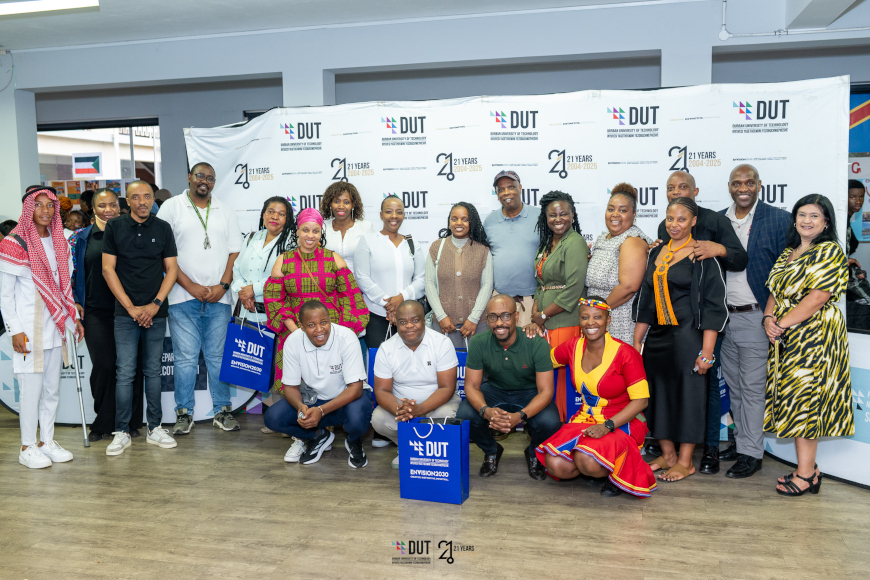The Durban University of Technology (DUT) Department of Ecotourism recently hosted its inaugural Ecotourism Indaba at the Riverside campus in Midlands. The three-day event, which coincided with National Tourism Month, created a vibrant space for dialogue, collaboration, and innovation, while celebrating South Africa’s cultural diversity and rich natural heritage.
The programme was officially opened by the Midlands Campus Director, Dr Nonhlanhla Mthiyane, who warmly welcomed industry partners, DUT staff, students, and high school learners. In her address, she described the Indaba as more than an event but a platform that reflected DUT’s values and commitment to sustainability. She emphasised that ecotourism was not only about showcasing destinations but also about protecting natural heritage, uplifting communities, and building a sustainable future.
Speaking directly to Grade 11 Tourism learners from Siyanda High School, Dr Mthiyane encouraged them to participate actively and to draw inspiration from the exhibitions, reminding them that they were the next generation of leaders and change-makers. She also urged DUT students to be creative, distinctive, and impactful in preserving the environment, noting that their future careers in the sector depended on sustainable practices.
The Head of the Department of Ecotourism, Dr Nsizwazikhona Chili, also addressed the gathering and spoke about the importance of using every opportunity to effect positive change. He highlighted DUT’s strong focus on entrepreneurship, explaining that the aim was not only to prepare students for employment but also to equip them with skills for self-employment and business creation. He reminded students that transformation does not mean selfishness, but selflessness, explaining that true change uplifts others and leaves a legacy for generations to come. He further encouraged students to embrace tourism as a sector full of opportunities, particularly when approached with an entrepreneurial mindset.
The Indaba’s opening day featured a lively exhibition led by 287 second-year Tourism students, who showcased tourism attractions across Africa with displays that integrated traditional food, attire, and culture, reflecting the continent’s diversity. Industry partners such as EDTEA, African Link, KZN Wildlife, the Mandela Capture Site, Travel with Flair, KZN Museum as well Redlands Hotel participated by assessing the students’ projects through an integrated rubric that covered event management, marketing, and tourism management. At the same time, grade 11 tourism learners from Siyanda High School took part in an itinerary design competition, where prizes and certificates were awarded to the best teams.
The programme also recognised excellence among students. After the second-year exhibitions, the department together with industry partners provided feedback and awarded prizes to the groups with the best exhibition stands. The Kenya group was announced as the winner, receiving the Best Exhibition Stand Award. Speaking on behalf of her group, Nonjabulo Sigwebela expressed her excitement and gratitude for the recognition.
Day two of the Ecotourism Indaba placed a strong emphasis on environmental conservation, with a major highlight being the annual uMsunduzi River Cleanup—now proudly in its third consecutive year. A total of 153 first-year Ecotourism students actively participated in this hands-on initiative, aimed at promoting ecological awareness and sustainable environmental practices.

Students collected over 300 bags of waste.
Guided by their lecturers, the students worked collaboratively to remove litter from the riverbanks, collecting over 300 bags of waste. Attired in Ecotourism-branded t-shirts and equipped with safety gloves and litter bags, the students not only cleaned the natural environment but also embodied the principles of responsible ecotourism. Their involvement demonstrated a practical application of classroom knowledge and a deepened understanding of the critical link between tourism and conservation.
In addition to the cleanup, the day featured a series of insightful presentations delivered by the first-year students themselves. These presentations explored the ecological importance of rivers as vital (and fragile) ecosystems and examined the interdependence between ecotourism and the natural environment. By reflecting on the role rivers play in biodiversity, water security, and tourism experiences, students reinforced the idea that protecting natural resources is essential for the long-term sustainability of the ecotourism industry.
The Indaba concluded on the third day with an online webinar themed “A Future for Eco-Tourism” through the lens of Climate Change, which drew over 150 participants and connected universities from Kenya, Midlands State University from Zimbabwe, Tanzania Sokoine University of Agriculture from Tanzania, and across South Africa. The virtual discussions examined the impact of climate change on ecotourism and provided students with valuable regional and international perspectives on sustainability. Guest speakers included Dr Ariel Prinsloo, Postdoctoral Research Fellow at the University of the Witwatersrand, and Ms Nelisiwe Mvuni, Environmental & Climate Change Practitioner at the Ekurhuleni Metropolitan Municipality.
Lecturer Mrs Janice Naidoo praised the Indaba as a living example of ENVISION2030, DUT’s long-term strategic framework. She highlighted how the event aligned closely with the core values and strategic focus areas of the institution, including student-centredness, environmental responsibility, innovative research, meaningful community engagement, and long-term sustainability.
Mrs Naidoo commended both staff and students for their unwavering dedication and active participation, noting that the success of the Indaba was not the result of individual efforts alone. Instead, she emphasised that it was a truly collaborative achievement, every member of the department played a vital role in planning, organising, and executing the event. Their collective commitment, she added, reflected the spirit of unity and shared purpose that lied at the core of DUT’s vision for the future.
The inaugural DUT Ecotourism Indaba was made possible through the generous support of key sponsors, including the South African Health Foundation, Aquelle, and the City of Choice. Centred around the unifying theme “A Future for Eco-Tourism,” the event served as a platform to showcase student talent, innovation, and creativity.
Beyond highlighting academic excellence, the Indaba also played a crucial role in strengthening collaborations between the university, industry stakeholders, and the wider community. This partnership-driven approach reinforced DUT’s commitment to shaping sustainable futures and ensured the university remained at the forefront of advancing Ecotourism in South Africa and beyond.
Pictured: Ecotourism staff members and industry partners from EDTEA, African Link, KZN Wildlife, the Mandela Capture Site, Travel with Flair, KZN Museum, and Redlands Hotel.
Photographer: Khulasande Tshayile.
Sinamile Sithole

